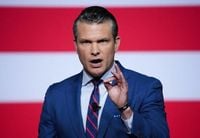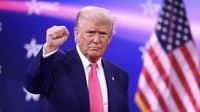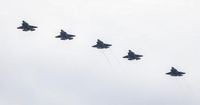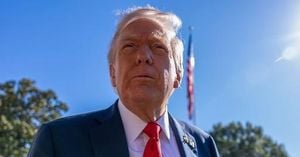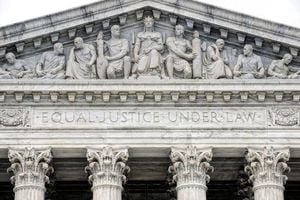The crisis simmering between the United States and Venezuela has reached a fever pitch in early October 2025, as American warships and fighter jets crowd the Caribbean and U.S. military strikes target vessels allegedly ferrying narcotics from Venezuelan shores. President Donald Trump, never one to shy away from bold declarations, announced on October 5 that the next phase of the U.S. campaign would shift its focus from the high seas to terrestrial drug trafficking. "We have all permitted authorizations. They are designated as foreign terrorist organizations," U.S. Secretary of Defense Pete Hegseth told Fox News, referring to the organizations targeted in the military operations. The U.S. claims these groups, including the notorious Tren de Aragua, are responsible for pumping drugs into American communities.
On the night of October 4, U.S. forces intercepted another vessel off Venezuela’s coast, allegedly loaded with narcotics. The previous day, an air strike on a boat in international waters left four people dead—marking the fourth such attack in the Caribbean since early September. Hegseth shared video of the operation and insisted, without providing evidence, that the men killed were "narco-terrorists" plotting an attack on the U.S. because they were "transporting substantial amounts of narcotics — headed to America to poison our people." According to The Guardian, this marks a significant escalation, with the Trump administration informing Congress that the U.S. is now in a "non-international armed conflict" with drug cartels.
But what does that mean, legally and practically? The White House’s legal justification hinges on its designation of groups like Tren de Aragua as foreign terrorist organizations (FTOs). This designation, advanced by Trump’s deputy chief of staff Stephen Miller, has been used to defend both lethal strikes and the deportation of Venezuelan nationals under the Alien Enemies Act. The administration claims that Tren de Aragua has infiltrated Venezuelan President Nicolás Maduro’s regime, framing cartel activity as a "predatory incursion" by a foreign nation.
However, legal experts have raised red flags. Geoffrey S. Corn, a retired Army law-of-war adviser, told The New York Times that "drug cartels were not engaged in 'hostilities' — the standard for when there is an armed conflict for legal purposes — against the United States because selling a dangerous product is different from an armed attack." He called the president’s move "an abuse" and warned, "This is not stretching the envelope. This is shredding it. This is tearing it apart." Law professor Marty Lederman, writing in Just Security, argued that the administration’s armed-conflict justification is "groundless," noting that the Trump team has yet to show that any cartel is an "organized armed group" with the necessary command structure or that it has engaged in protracted armed violence against the U.S.
David Cole, writing in The New York Review, was even more direct: "The 'war on drugs' is a metaphor, not a legal term of art that authorizes killing the 'enemy.' The human beings on these boats were civilians, and even if there were an actual war going on, the laws of war prohibit targeting civilians unless they are directly engaged in hostilities." Cole argued that, at most, those on the boats could have been arrested and tried—not killed without trial. He warned that each questionable exercise of executive authority "eases the way for further expansions."
Meanwhile, the international reaction has been swift. Russian Chancellor Sergei Lavrov threw Moscow’s weight behind Caracas, expressing "full support and solidarity" with Venezuela after the U.S. attacks. Russia’s Foreign Ministry warned that Washington’s escalation in the Caribbean could have "long-reach consequences for the region," and reaffirmed its commitment to keeping Latin America and the Caribbean a "peace zone." The Venezuelan government, for its part, accused Trump of using the drug war as a pretext for regime change. President Maduro, already under intense pressure from U.S. sanctions and diplomatic isolation, warned against a U.S. invasion and rallied his supporters around calls for national solidarity.
Despite the saber-rattling, most analysts believe a full-scale U.S. invasion remains unlikely. According to Robert Muggah of the Igarapé Institute, the odds of a U.S. strike against Venezuela before the end of 2025 are roughly 1 in 3, with the chances rising into 2026. However, public opinion in the U.S. acts as a brake: most Americans oppose military action to topple Maduro, and an even larger majority reject the idea of a full-scale invasion. Instead, the Trump administration seems to be pursuing a strategy of "pressure without full commitment," using shows of force, sanctions, and targeted strikes to weaken Maduro’s grip while avoiding a messy war or an oil shock.
But is Venezuela really the linchpin of the drug trade to the U.S., as the administration claims? The evidence suggests otherwise. As The New York Times reported, Venezuela is not a major producer of cocaine—Colombia holds that title—but serves as a transit hub. U.S. estimates from 2020 put the amount of cocaine flowing through Venezuela at 200 to 250 metric tons annually, roughly 10 to 13 percent of the global supply. By contrast, in 2018, 1,400 metric tons moved through Guatemala. Venezuela’s domestic cocaine cultivation is negligible, and most trafficking is enabled by weak state institutions and widespread corruption. The so-called "Cartel de los Soles"—a term referring to networks of military and political elites involved in smuggling—functions more as a criminal patronage system than a conventional cartel. The phrase, in use since the 1990s, refers to the sun insignia worn by Venezuelan generals implicated in trafficking.
There’s also a geopolitical dimension to the U.S. military buildup. Beyond the anti-drug campaign, Washington has sought to bolster Guyana—a U.S. ally and emerging petrostate—against threats from Venezuela. This has further complicated the regional picture, with other Latin American governments wary of a return to the days of "Yanqui" interventionism. According to The Guardian, Trump’s erratic approach—"throwing his weight about, making impetuous misjudgments, stoking fear of foreigners and basing policy on whether he 'likes' other leaders"—has drawn criticism even from those who share his hardline stance on drugs.
Critics argue that far from weakening Maduro, the U.S. pressure campaign may in fact be strengthening his regime. As the crisis deepens, Maduro has assumed "special powers" and rallied public opinion behind patriotic calls for resistance. Trump’s approach has also spurred a regional backlash, with most governments in Latin America opposing the idea of U.S. military intervention and some warning that it could play into the hands of China, now an increasingly influential player in the region.
As the standoff continues, the stakes remain high for both Washington and Caracas. For now, the U.S. strategy appears to be one of containment and pressure, but with tensions mounting and legal questions swirling, the risk of miscalculation is ever-present. The world watches closely to see whether this latest chapter in U.S.-Venezuela relations will end in negotiation, further escalation, or something far more dangerous.
